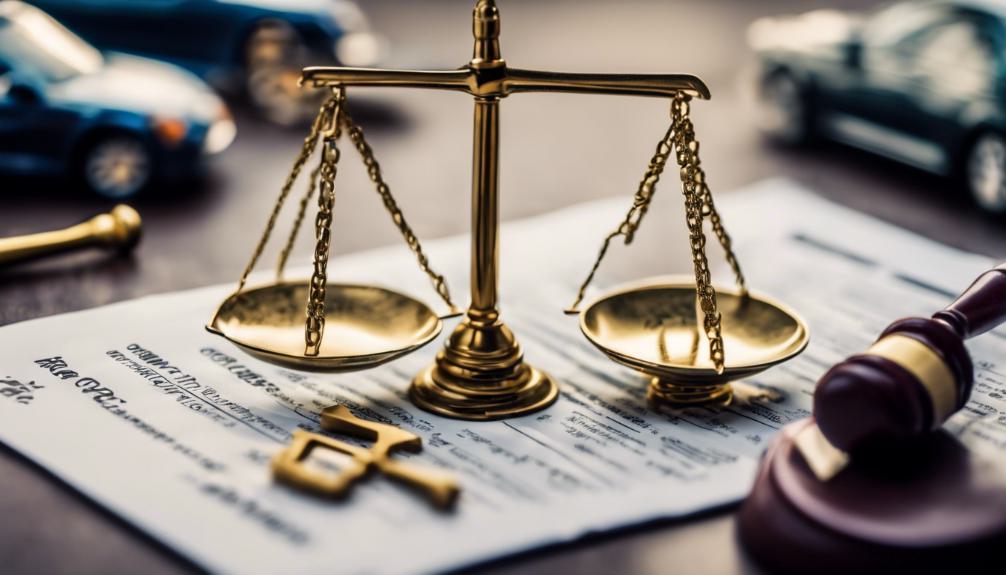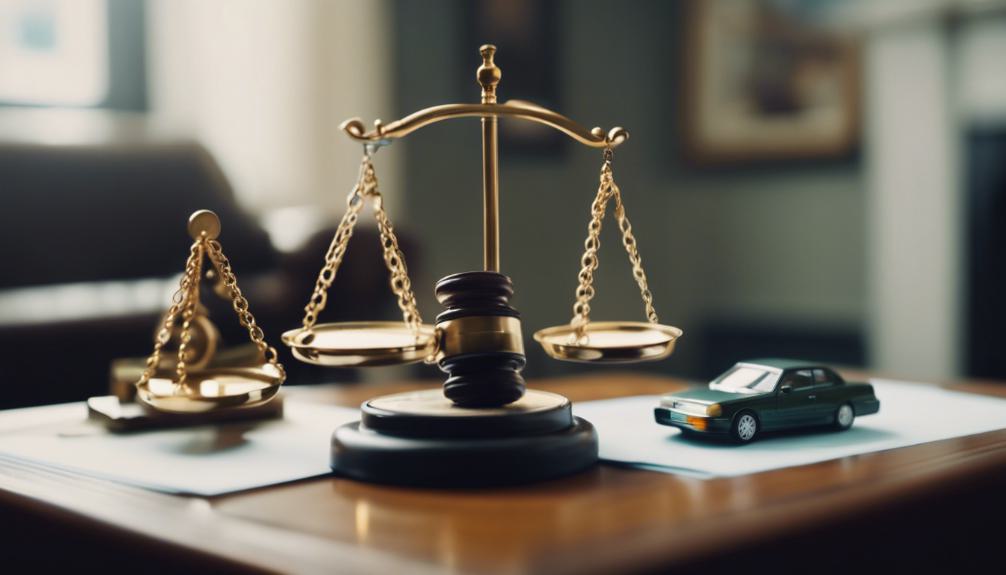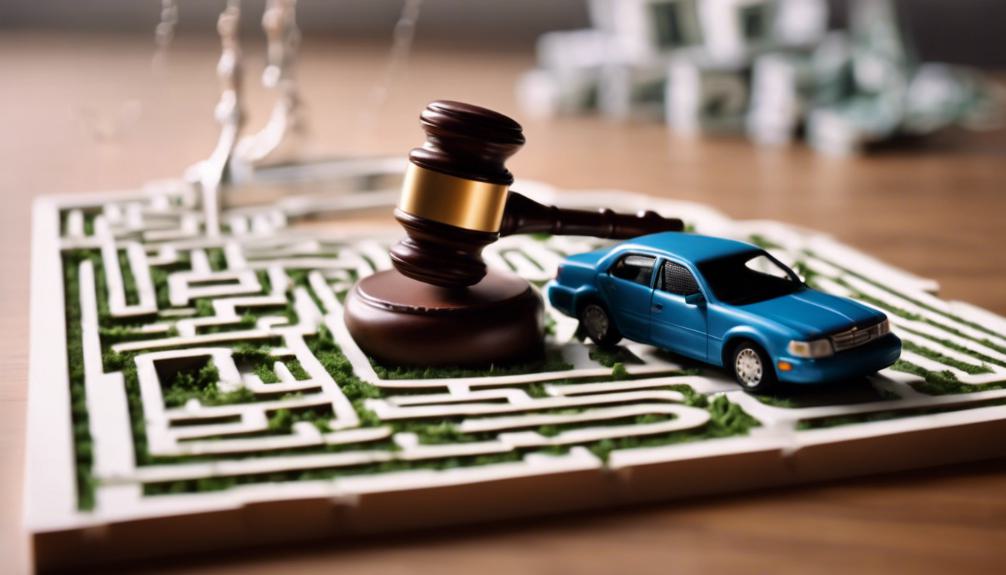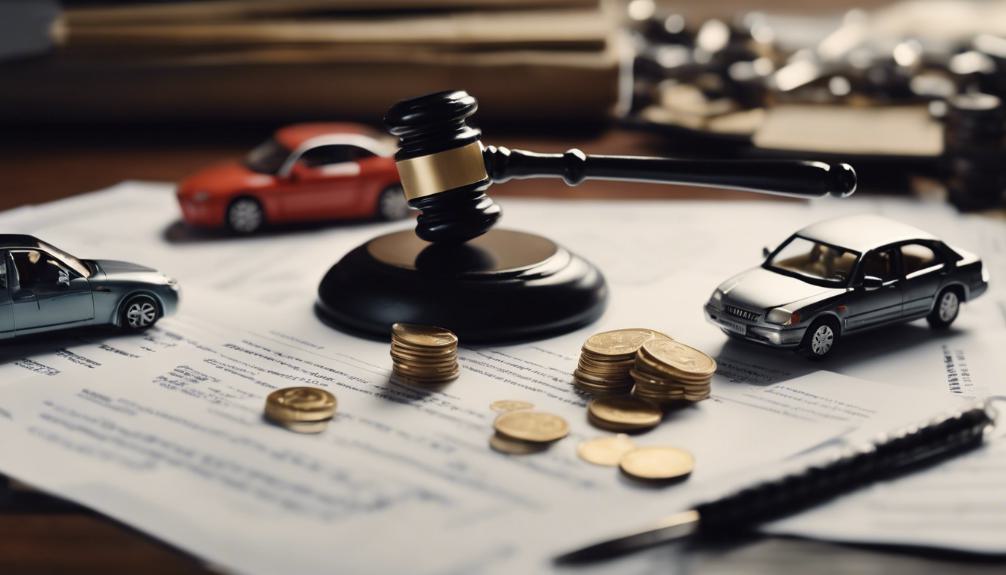Navigating Car Accident Claims: Fees Unveiled
The labyrinth of traversing car accident claims extends beyond the immediate aftermath of the incident, particularly when confronting the spectrum of legal fees involved. This discourse seeks to elucidate the complexities surrounding the financial obligations that accompany such claims, from contingency fees to the less discussed, yet equally pivotal, ancillary costs. With the landscape of legal assistance varying greatly, understanding the nuances of these charges is not only paramount for making informed decisions but also for anticipating the financial trajectory of seeking justice. As we unpack the layers of legal fees, a critical question emerges: how does one balance the quest for rightful compensation with the reality of these financial commitments?

Key Takeaways
- Lawyer fees in car accident cases typically range from 25-40% based on contingency agreements.
- Legal expenses beyond lawyer fees include court filing and expert witness fees, which may be deducted from the settlement.
- Hiring a lawyer can significantly increase compensation amounts, with represented victims receiving an average of $44,600.
- Various payment structures exist, including hourly rates and flat fees, though contingency is most common in car accident claims.
Understanding Resolution Methods

Understanding the resolution of car accident claims involves grasping the two primary methods: settlements and court judgments. When a victim of a car accident decides to seek compensation, they are presented with the option of either accepting a settlement offer from the opposing party or proceeding to court for a judgment. Settlements are often negotiated between the victim's attorney and the at-fault party's insurance company, aiming for a compensation amount that both sides can agree upon. This method is generally quicker and less adversarial than going to trial. However, if a satisfactory agreement cannot be reached, the case may move to court, where a judge or jury will determine the compensation based on the evidence presented. Each method has its own processes, timelines, and strategies for achieving the desired outcome.
Contingency Fees Explained

Contingency fees, a common payment structure in car accident cases, are calculated as a percentage of the compensation awarded to the victim. This method aligns the interests of the attorney and the client, as the lawyer only receives a fee if they successfully secure compensation for the victim. Typically ranging from 25% to 40%, the exact percentage can vary based on the complexity of the case and the law firm's policies. This arrangement enables victims to pursue legal action without the burden of upfront legal fees, ensuring that access to justice is not limited by financial constraints. In addition, it motivates attorneys to achieve the best possible outcome, as their payment is directly tied to the success of the case.
Additional Legal Expenses

While contingency fees cover the lawyer's payment based on the case's outcome, additional legal expenses are an inevitable part of pursuing a personal injury claim. These costs, separate from the attorney's fees, can have a notable impact on the overall financial considerations of a case. They may include court filing fees, costs for obtaining medical records, expenses related to expert witnesses, and charges for investigators. Some law firms may advance these expenses on behalf of their clients, to be reimbursed from any settlement or judgment awarded. It's important for clients to understand these potential costs upfront and discuss how they will be handled. Transparency about additional legal expenses makes certain clients are not caught off guard and can make informed decisions about pursuing their claims.
Alternative Payment Structures

Beyond contingency fees, several other payment structures exist for legal representation in car accident cases, including hourly rates, flat fees, and retainers. Hourly rates are straightforward, charging a specified rate for each hour the lawyer works on your case. This method provides transparency but can add up quickly if the case becomes prolonged. Flat fees offer a one-time charge for the entire service, beneficial for clients seeking budget predictability. However, this structure might not cover unexpected complexities that arise. Finally, retainers involve an upfront payment used against future legal services, ensuring the lawyer's availability throughout the case's duration. These alternatives give clients flexibility in managing legal costs, aligning with their financial circumstances and case specifics.
The Case for Legal Representation

Understanding the diverse payment structures for legal representation in car accident cases illuminates the importance of selecting the right attorney to advocate effectively on one's behalf. The choice between contingency fees, hourly rates, flat fees, and retainers plays a crucial role in the financial aspect of pursuing a claim. It's not just about the percentage or amount paid but also about how these fees align with the client's circumstances and the case's nature. Additionally, the responsibility for additional expenses—such as court filing fees and expert witness fees—varies by firm, influencing the total cost of legal representation. This financial landscape underscores the necessity of careful attorney selection, ensuring that their payment structure and policy on covering expenses align with the client's financial situation and goals for the case.
Statistical Advantage of Attorneys

The presence of a car accident attorney statistically increases the likelihood of receiving higher compensation for victims. This advantage is not merely anecdotal but is supported by compelling data that underscores the value of legal representation in these cases. Studies and historical claim outcomes reveal that individuals who engage the services of attorneys after a car accident generally secure more favorable financial recoveries compared to those who navigate the claims process unassisted. This statistical edge can be attributed to the expertise and negotiation skills that seasoned lawyers bring to the table. They possess a deep understanding of legal intricacies and are adept at advocating for their clients' best interests, ensuring that the compensation awarded reflects the true extent of the damages and losses suffered.
Average Compensation With Lawyers

Reflecting on the statistical advantage of attorneys in securing higher compensation for car accident victims, it becomes pertinent to examine the average compensation amounts that clients can expect when represented by legal counsel. Data reveals that victims represented by attorneys typically receive notably higher settlements or court awards compared to those who navigate the claims process alone. On average, clients with legal representation have been awarded compensation amounts upwards of $44,600, starkly contrasting with the $13,900 average for unrepresented victims. This disparity underscores the substantial impact that skilled legal representation can have on the outcome of a car accident claim. Consequently, engaging an attorney not only enhances the likelihood of receiving compensation but also substantially increases the potential compensation amount, thereby affirming the value of legal expertise in these matters.
Negotiation and Court Advocacy

Effective negotiation and court advocacy are pivotal elements in securing favorable outcomes in car accident cases. The skillful negotiation abilities of an attorney can make a significant difference in the settlement amount offered by insurance companies. Lawyers draw upon their experience and understanding of case nuances to argue effectively for the compensation their clients deserve. In instances where settlement negotiations stall or an agreement cannot be reached, a lawyer's role shifts towards court advocacy. Here, they present evidence, cross-examine witnesses, and construct compelling arguments to persuade the court of their client's entitlement to compensation. Mastery in both negotiation and court advocacy guarantees that victims of car accidents are not only heard but fairly compensated for their losses, highlighting the indispensable value of legal representation in these matters.
Unrepresented Victims' Compensation

Victims of car accidents who manage the legal process without representation often face significant disparities in compensation outcomes. The challenging complexity of legal proceedings can disadvantage those unfamiliar with the intricacies of personal injury law. Statistically, unrepresented victims receive an average of $13,900 in compensation, a stark contrast to the $44,600 average for those with legal representation. This difference highlights the critical role attorneys play in maximizing compensation. Attorneys leverage their expertise to negotiate more effectively with insurance companies and, if necessary, present a stronger case in court. Without this professional advocacy, victims may not only receive less than they deserve but also struggle with handling the legal system efficiently and effectively.
No-Win, No-Fee Structure

Understanding the disparities in compensation between represented and unrepresented victims underscores the significance of the no-win, no-fee structure in legal representation for car accident cases. This arrangement, also known as a contingency fee agreement, guarantees that victims receive legal support without upfront costs. Attorneys only recover their fees if they successfully secure compensation for the client, aligning their interests with those of the victim. This model democratizes access to legal representation, enabling individuals of all financial backgrounds to pursue justice and fair compensation. It eliminates the financial risk associated with hiring legal assistance, as clients are not burdened with legal fees unless their case is successful, fostering a more equitable legal landscape for car accident victims.
Enhancing Compensation Chances

Maximizing your compensation after a car accident requires strategic legal representation to navigate the complexities of personal injury claims. Hiring a skilled attorney greatly increases your chances of receiving a fair settlement or court judgment. Legal professionals are adept at evaluating the full extent of damages, including medical expenses, lost wages, and pain and suffering, ensuring that no aspect of your claim is overlooked. Their expertise in negotiation can substantially leverage your position against insurance companies, who often aim to minimize payouts. Additionally, an attorney's ability to articulate and substantiate your claim can make a compelling case for maximum compensation, either through meticulous settlement negotiations or, if necessary, aggressive representation in court.
Legal Process Navigation

Handling the legal process after a car accident requires a thorough understanding of personal injury law and the procedural steps necessary for filing and winning a claim. The journey begins with gathering evidence, including photographs, witness statements, and medical records, which are essential for building a strong case. Victims must then file a claim with the responsible party's insurance company, a step that involves detailed documentation and adherence to specific deadlines. Throughout this process, maneuvering the legal system's complexities can be overwhelming for individuals without legal experience. This is where the expertise of a car accident lawyer becomes invaluable. Lawyers not only provide guidance on the procedural aspects but also safeguard that their clients' rights are protected, helping to avoid common pitfalls that could weaken their claim or result in unnecessary delays.
Settlement Negotiation Tactics

Mastering settlement negotiation tactics is important for car accident victims seeking equitable compensation. Effective strategies involve a thorough understanding of the case value, which includes evaluating the extent of injuries, property damage, and the impact on the victim's quality of life. Skilled negotiators leverage this evaluation to counter lowball offers from insurance companies, often using evidence such as medical reports and expert testimonies to substantiate claims. Patience plays an important role; rushing to accept the initial offer can undermine the negotiation process. Additionally, effective communication and the ability to articulate the victim's needs and the justification for a higher settlement are paramount. These tactics, combined with a deep understanding of legal precedents and insurance policies, empower victims to achieve favorable settlements.
Importance of Informed Decisions

Making informed decisions is important in steering the complexities of car accident claims to guarantee the best possible outcome. When maneuvering through such claims, understanding the intricacies of resolution methods, lawyer fees, and associated legal expenses is essential. Whether opting for a settlement or proceeding to court, the choice greatly impacts the financial and emotional toll on the victim. Additionally, selecting the right legal representation can dramatically alter the compensation received. As data suggests, victims represented by attorneys often secure higher compensation than those without. Being well-informed about the potential costs, payment methods, and benefits of legal representation is crucial. This knowledge empowers victims to make choices that align with their best interests, ensuring a more favorable resolution of their car accident claim.
Frequently Asked Questions
How Does One Determine if a Car Accident Case Is Worth Pursuing Legally, Especially Considering Potential Legal Fees and Expenses?
Determining the viability of pursuing a car accident case legally involves evaluating the potential compensation against anticipated legal fees and expenses, considering the severity of injuries, fault, and the impact on one's life and finances.
In the Event of a Minor Car Accident With Minimal Damage and No Injuries, Is It Still Advisable to Consult a Car Accident Lawyer?
In minor car accidents with minimal damage and no injuries, consulting a car accident lawyer may not be necessary. However, an initial consultation can provide clarity on legal rights and potential compensation, aiding in informed decision-making.
How Do Car Accident Lawyers Assist Clients With the Emotional and Psychological Impact of an Accident, Beyond the Legal and Financial Aspects?
Car accident lawyers provide thorough support, extending beyond legal and financial aspects to include guidance on managing the emotional and psychological impacts of accidents, ensuring clients receive holistic assistance throughout the recovery and claim process.
Can a Client Switch Lawyers Mid-Case if They Are Dissatisfied With Their Current Legal Representation, and What Are the Implications for Fees and Case Continuity?
Clients may switch legal representation mid-case if dissatisfied, though this decision could affect case continuity and financial agreements. Understanding potential implications for lawyer fees and the seamless progression of the case is crucial.
How Do Law Firms Handle Cases Where the Settlement Offer Is Significantly Lower Than Expected, and What Strategies Do They Employ to Ensure Fair Compensation Is Still Achieved?
Law firms employ negotiation and litigation strategies when settlement offers fall short of expectations, leveraging evidence and legal expertise to secure fair compensation. They may also reassess the case's strengths and explore alternative dispute resolution methods.
Conclusion
In summary, the resolution of car accident claims embodies a complex interplay between various legal processes and financial considerations. The engagement of skilled auto injury lawyers, operating on a contingency fee basis, often proves indispensable in maneuvering these intricacies. Additionally, understanding the spectrum of potential legal expenses and payment structures is essential. Legal representation not only facilitates informed decision-making but also greatly enhances the prospects of securing full compensation, underscoring the importance of competent legal support in advocating for victims' rights.

This post has been generated by AI and was not reviewed by editors. This is Not legal advice. Please consult with an attorney.




